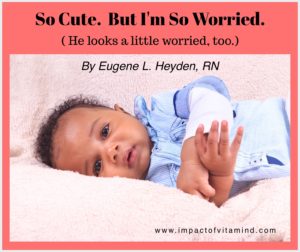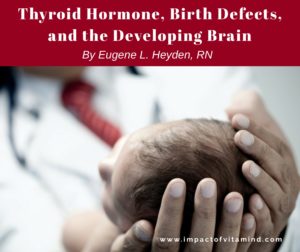I Promise, I Will Not Lose You

Last update: 01-29-24
By Eugene l. Heyden, RN
Baby looks a little fragile. I know you’re worried. A friend of a friend told me you lost your first baby. I am so very sorry.
Some mothers under these or similar circumstances worry and hope for the best. Of course, they do their best. That’s what mothers do. Some mothers worry and hope for the best, but also realize they are not only “Mom” they are “Advocate,” too. Their babies are fragile and may be struggling, with a future uncertain. Something needs to be done. Someone named Mom will have to become a little more educated and more involved than she once thought. She will need to be on her toes, recognizing when medical attention is needed and knowing what to ask for and why. She may need to be persistent, too.
In general, the fragile baby is likely to have been born vitamin D deficient and likely to continue so. When it comes to finding and treating the vitamin D baby, the standard of practice in Medicine is not evenly applied and recognizably not up to date. (That’s putting it mildly.) As a result, many babies suffer unnecessary infections, growth impairment, developmental delay, and neurological damage, perhaps beyond repair. Baby’s brain is so important! It’s his or her greatest possession. It is one of your greatest possessions.
“It is clear that disrupting prenatal vitamin D can have significant effects on the developing brain with adverse consequences later in life.” (Markham and Koenig, 2011, emphasis added)
“Vitamin D deficiency has been linked to an increased incidence of schizophrenia and depression. Maintaining vitamin D sufficiency in utero and during early life, to satisfy the vitamin D receptor transcriptional activity in the brain, may be important for brain development as well as for maintenance of mental function later in life.” (Holick, 2007, emphasis added)
These words mean something. Vitamin D deficiency must be avoided in someone new, and particularly so it they are struggling in life. If vitamin D deficiency is present, it must be corrected. Otherwise, babies are damaged and babies will die. Not all of them will die, but some of them will die. “Advocate Mom” needs to ask her physician for a blood test to reveal if Baby is deficient, and if so, by how much, and so do without delay. When she makes this request, she should probably have that “you’re going to do this or else!” look in her eye. “No” is not an option. And in the likely event that Baby is vitamin D deficient, corrective action should be immediately taken. Is this too much to ask? So much is at stake.
Oh! I hear you are nursing. This pleases me. Breast milk has so many good things hidden within. But chances are, if you are not supplementing with at least 2,000 IU (International Units), better yet 4,000 IU to 6,000 IU of vitamin D per day, precious little vitamin D will show up in your breast milk (Hollis and Waggoner, 2004; Hollis et al., 2015). Unless faithful supplementation takes place, under these conditions Baby will lead the vitamin D deficient life—more at risk for disease, more at risk for developmental compromise. I document all this in my book Mommy, Me, and Vitamin D.
As an advocate for Baby, let the doctor know that you have no interest in the current standard of care. Simply state, “What I want is care centered around the latest and best that research has to offer.” Is this too much to ask? Many, many babies do not receive screening and treatment for vitamin D deficiency; and if they do, the vitamin D complementation they receive is likely not be enough.
“Pediatricians should have a low threshold for screening for vitamin D deficiency in the presence of nonspecific symptoms such as poor growth, gross motor delays, and unusual irritability.” (Misra et al., 2008)
Let’s move on to another important topic. I’ll try to be brief. (Hard for me to do—your baby is at great risk!) Listen up!
“Iodine deficiency is not only present in developing countries, but also widely spread in European countries and the USA.” (Verheesen and Schweitzer, 2008, emphasis added)
“A 50% increase in iodine intake is recommend in order for pregnant women to produce enough thyroid hormones to meet fetal requirements.” (Skeaff, 2011, emphasis added)
“About one-third of pregnant women in the United States are iodine-deficient . . . . Currently, only about 15 percent of pregnant and breast-feeding women take supplements containing iodide, the researchers said.” (WebMD, 2014, emphasis added)
Another important item likely to be in short supply for the new baby is iodine. Most new mothers are so unaware. Most expectant mothers do not take a prenatal supplement containing the recommended 300 mcg of iodine per tablet (Leung et al., 2011). As a result, their babies are likely to be iodine deficient both before and after birth. As a consequence, many new babies have not accumulated enough to iodine in their tiny little thyroid glands to allow them to produce enough thyroid hormone to meet their daily and long-term needs. Thyroid hormone is an absolute requirement for normal brain development. It is the hormone that orchestrates the genetic events that allow a baby to develop normally. As a result, thyroid hormone deficiency goes unnoticed, and many babies will experience neurological compromise or worse. Death is worse.
“All degrees of iodine deficiency . . . affect thyroid function of the mother and the neonate as well as the mental development of the child.” (Delange, 2001, emphasis added)
“Iodine deficiency increases neonatal mortality. We emphasize this statement so that iodine deficiency can take its proper place among disorders that kill children.” (Dunn and Delange, 2001, emphasis added)
It looks like Mom has more to talk to the doctor about than previously thought. Dear reader, please be aware that supplementing with iodine can, at times, be tricky business in ladies who make babies (particularly if their iodine deficiency had been longstanding or they have autoimmune thyroid disease)—and there are no available tests to determine iodine deficiency for Baby or for Mom. So under these circumstances, iodine supplementation should be managed by a physician—better yet a physician who holds the title Endocrinologist. Since you are breast feeding, perhaps the best way to treat and prevent iodine deficiency in Baby is for you to take an iodine supplement (under doctor’s supervision). If all goes as planned, supplemental iodine will pass right through you and right into Baby, one feeding at a time.
If Baby, for some reason, needs to be formula fed, it may be wise to question the use of soy formula. Soy tends to interfere with the uptake of iodine in the thyroid gland and may actually make Baby hypothyroid, if not hypothyroid already (Román, 2007). This can be damaging to Baby’s brain. In any case, any formula in use must contain enough iodine to do the job. In this regard, not all formulas are up to the task. And may I say this? For the fragile baby who is not being breastfed by Mother herself, donor human milk may be a wise choice. Perhaps the donating mother should be supplementing with iodine while “gifting” her milk to the compromised baby, just to make sure enough iodine can pass through her and into the one in need.
And since I mention the word Endocrinologist, you probably should have one on your side, particularly if you experienced thyroid hormone issues during pregnancy. Don’t be afraid to ask your primary physician for a referral.
“Pregnant women with thyroid disease should be diagnosed and the treatment managed preferably in multidisciplinary clinics, where obstetricians, endocrinologists, pediatricians and other healthcare professionals can jointly work together to reduce risks of adverse pregnancy and neonatal outcomes associated with thyroid disease.” (Männistö, 2013)
Also, it is quite possible that anti-thyroid antibodies, passed from you to your baby, may be making Baby hypothyroid (Rastogi and LaFranchi, 2010). The endocrinologist can easily sort out this issue and take corrective action.
“Ten to 20% of pregnant women have anti-thyroid antibodies as do 1/10 of newborn infants.” (Nelson, 2009)
The good news here is that anti-thyroid antibodies from Mom generally disappear within weeks after birth (Foley, Jr et al, 1994). But even so, the affected neonate is off to a slower start in life than he or she should be and Baby has a lot of catching up to do. Furthermore, although this problem may go away, thyroid issues may remain—hence, my strong belief that an endocrinologist should be involved in the care of the struggling baby.
Just so you know, a new mom worrying about her baby is standard operating practice—so many things can go wrong. And it is mom’s job to worry. But kids are tough! They can often overcome adversity and turn out normal if corrective action is taken in a timely manner (and if we keep our fingers crossed). So do your best. With you on your toes, and advocating intelligently and successfully (and forcibly) on Baby’s behalf, things should turn out just fine.
One last thing I want you to be aware of: Mothers who eat the Western diet (that’s probably you), receive too much of a fatty acid called omega-6 and generally do not eat enough foods that contain the fatty acid DHA. A deficiency of DHA can interfere with proper brain development. (see Morse, 2012) Supplementing with the purest of fish oils (to reduce exposure to such evils as mercury), and eating more healthfully, may be a step in the right direction. With respect to fish oil supplementation, you should probably run this by the physician involved before you begin. Don’t like fish? There are alternative sources of DHA.
Dear Worried Advocate Mom With Struggling Baby, I hope you will act on the information presented. I want what is best for your baby. I want what is best for you. Worrying and doing nothing will not help struggling Baby.
Related Posts (Click image too open)
References
Delange F 2001 Iodine Deficiency as a Cause of Brain Damage. Postgrad Med J 77:217–220
Dunn JT, Delange F 2001 Damaged Reproduction: The Most Important Consequence of Iodine Deficiency. The Journal of Clinical Investigation 86(6):2360–2363
Foley Jr TP, Abbassi V, Copeland KC, Draznin MB 1994 Brief Report: Hypothyroidism Caused by Chronic Autoimmune Thyroiditis in Very Young Infants. New England Journal of Medicine; Feb 14; 330(7), 466–468
Holick MF 2007 Vitamin D Deficiency. New England Journal of Medicine; July 19; 357:266–281
Hollis BW, Wagner CL 2004 Assessment of Dietary Vitamin D Requirements during Pregnancy and Lactation. Am J Clin Nutr 79:717–726
Hollis BW, Wagner CL, Howard CR, Ebeling M, Shary JR, Smith PG, Taylor SN, Morella K, Lawrence RA, Hulsey TC 2015 Maternal Versus Infant Vitamin D Supplementation During Lactation: A Randomized Controlled Trial. Pediatrics; Oct 1; 136(4):625–34.
Leung AM, LaMar A, He X, Braverman LE, Pearce EN 2011 Iodine Status and Thyroid Function of Boston-Area Vegetarians and Vegans. J Clin Endocrinol Metab; August; 96(8):E1303–1307
Männistö T 2013 Thyroid Disease during Pregnancy. http://www.medscape.com/view article/814179_print
Markham JA, Koenig JI 2011 Prenatal Stress: Role in Psychotic and Depressive Diseases. Psychopharmacology 214(1):89–106
Misra M, Pacaud D, Petryk A, Collett-Solberg PF, Kappy M 2008 Vitamin D Deficiency in Children and Its Management: Review of Current Knowledge and Recommendations. Pediatrics 122:398–417
Morse NL 2012 Benefits of Docosahexaenoic Acid, Folic Acid, Vitamin D and Iodine on Foetal and Infant Brain Development and Function Following Maternal Supplementation during Pregnancy and Lactation. Nutrients 4(7):799–840
Nelson KB 2009 Preventing Cerebral Palsy: Paths Not (Yet) Taken. Developmental Medicine & Child Neurology 51:765–769
Rastogi MV, LaFranchi SH 2010 Congenital Hypothyroidism. Orphanet Journal of Rare Diseases 5(17)
Román GC 2007 Autism: Transient In Utero Hypothyroxinemia Related to Maternal Flavonoid Ingestion during Pregnancy and to Other Environmental Antithyroid Agents. Journal of Neurological Sciences 262:15–26
Skeaff SA 2011 Iodine Deficiency in Pregnancy: The Effect on Neurodevelopment in the Child. Nutrients 3:265–273
Verheesen RH, Schweitzer CM 2008 Iodine Deficiency, More than Cretinism, and Goiter. Medical Hypotheses 71:645–648
WebMD 2014 Iodine Deficiency Common in Pregnancy, Docs Warn. May 26; http://www.webmd.com/baby/news/20140526/iodine-deficiency-common-in-pregnancy-pediatricians-warn#1
Copyright © 2016–2022 Eugene L. Heyden, RN
All Rights Reserved




